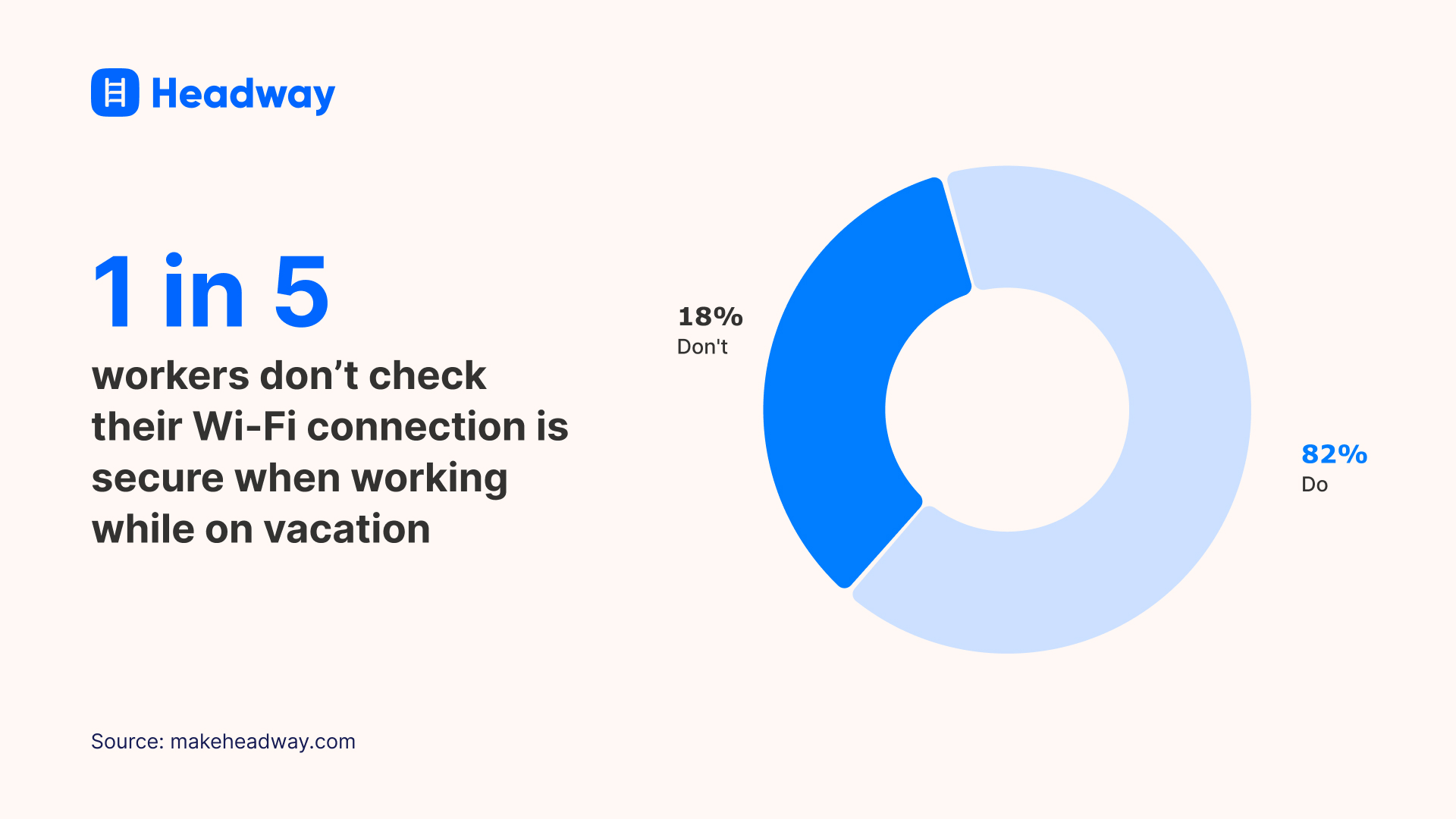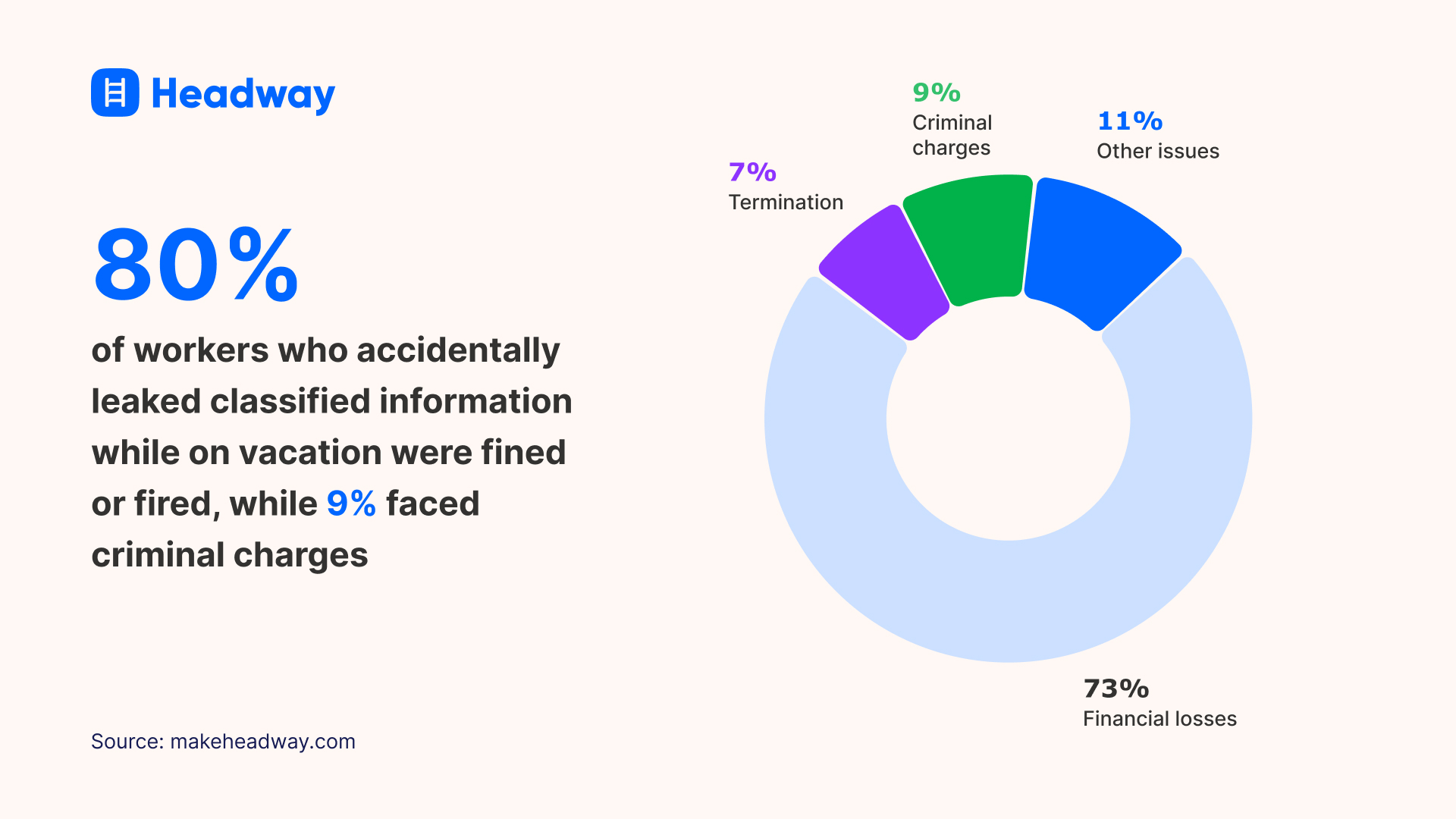Key takeaways:
Workcations are becoming more common, with 30% of people saying they occasionally work during their time off, and 8% reporting they do so regularly.
About 35% of people admit they're working on vacation simply because they genuinely enjoy their jobs. But, and this is worrying, 13% say their boss actually expects it, and 15% fear losing their job if they don't.
While away, distractions pile up: 59% get emails, 22% get texts, and 12% are bothered by phone calls from work, pulling them out of relaxation.
The personal toll is real — 35% have argued with their partner over vacation working, and more than half (52%) report mental health struggles like burnout or depression. Plus, roughly two-thirds have dealt with physical issues such as headaches or chronic pain.
Vacations once meant shutting the door on work stress. That clear break, though? It's not so clear anymore. These days, we basically carry the office with us — whether we want to or not. Our homes, hiking trails, and even the most remote beaches become spots where we check emails or approve reports. The idea of "work during vacation" is now a reality for many, and there’s no escaping it.
A recent survey by Headway, the book summary app, asked 2,000 employed adults about remote work while traveling. The results show something pretty concerning: traditional boundaries between work and time off have all but disappeared. Instead of relaxing, many people are staring down vacation burnout.
How common is the "work from vacation" habit?
You book a trip with the hope of unwinding, but once you get there, instead of diving into the pool or grabbing a drink, you find yourself opening your laptop. Working while on vacation isn't just a rare occurrence anymore. For a lot of people, it’s just part of the deal.

And here's the kicker: 35% have even canceled planned activities to prioritize work during vacation. That flips the whole idea on its head. It's not just fitting work around their holiday — it's vacationing around work.
Why do so many people end up working on vacation?

Some genuinely love what they do. For 35%, working on vacation is something they choose because, well, they like their jobs. But not everyone has that luxury.
A sizable chunk — about 34% — feel stuck because there's no one to cover their workload. Then there's the 13% who say their boss demands they stay plugged in. And 15% are just scared they’ll lose their job if they don't.

Anxiety is a real factor here. It's no surprise that 68% of people check work emails while away, and 66% say they have trouble truly switching off during vacation. We're supposed to recharge, right? Yet, most are still mentally stuck at their desks.

You might think setting an out-of-office message would give you some peace. Think again.

Around 59% of people report regularly getting emails while on vacation. Texts disrupt 22%, and phone calls bother 12%. It's like work has its own way of crashing your holiday, no matter where you are.
How working from vacation can backfire big time
When something urgent pops up, managers often expect vacationing workers to jump in immediately. But this can lead to risks.

Almost one in five — 18% — admit they log into work without checking if their Wi-Fi is secure, using hotel or public networks without thinking twice. It's a gamble.

And unfortunately, 12% have accidentally leaked sensitive company information while working from vacation spots.

That's not just a small slip-up — for 7% it cost them their job, and for 9% it led to even worse consequences like criminal charges.

That said, it's not all on employees. Nearly half of employers — 43% — don't offer cybersecurity training for people working remotely from places like hotels, airports, or tourist spots. So the risks go up, while support stays low.
Vacations interrupted: How work affects relationships

Vacations are supposed to be quality time with your partner, especially if you spend most days apart. But 44% say their vacation working habits have caused tension at home.

In fact, 35% admit these frustrations have sparked arguments. Suddenly, that dream getaway feels more like a travel nightmare — and ironically, some wish they were back at the office instead.
The real health costs of never fully unplugging

Working while on vacation has become so normal that nearly half (49%) feel guilty if they don't check in or sacrifice free time for their team.

You tell yourself an hour or two won't hurt. You put on sunscreen, pick up your laptop, and maybe knock out a quick task. But then the day slips away, and your "work from home while traveling" time creeps longer.
By the end of it, 61% still feel guilty about not fully unplugging.

The consequences aren't just mental. Anxiety affects 46%, depression 23%, and insomnia 26%. Burnout looms large if you never get a real break.

And it's not just in your head. Physical symptoms — headaches, chronic pain, even immune system struggles — hit about two-thirds of those trying to balance work during vacation.
So maybe that quick email check isn't as harmless as it feels.
Methodology: To create this study, researchers from the Headway app surveyed 2,000 professionals of all genders, aged 18 and over.
About the Headway app
With over 50 million users in 170+ countries, the Headway app is the world's most downloaded book summary app. It offers 15-minute audio and text summaries of nonfiction bestsellers, as well as daily microlearning sessions and gamified challenges. The app is designed to help people achieve their self-development goals. Headway received the Editor's Choice award from the US App Store and constantly hits the App Store home screen as App of the Day.






